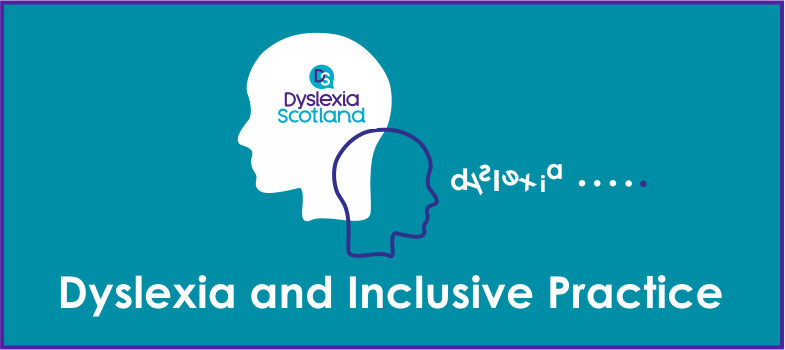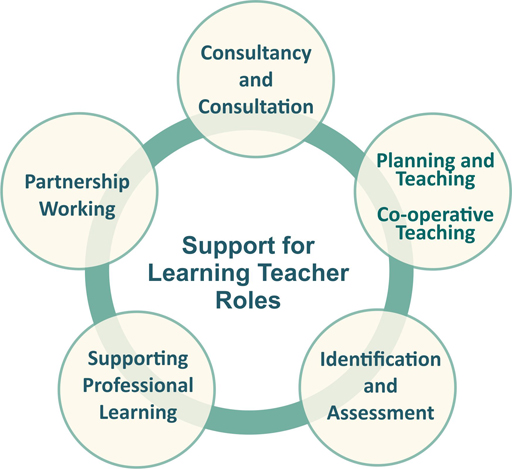6.2 Five roles of Support for learning teacher/pupil support teacher
Role of the Support for Learning Teacher (SfL Teacher)
The Support for Learning teacher works in partnership with appropriate practitioners and parents to meet the additional support needs of children and young people within their local authority staged level of intervention process. They assist class teachers and school management to ensure that children who have additional needs have those needs identified and met within Curriculum for Excellence.
Support should be delivered through the five well established roles of the Support for Learning teacher:
Figure 25 provides an overview of these roles.
- Consultancy/consultation
Consultancy can take place in many forms, from simply giving advice to working collaboratively with individuals or departments. Effective learning and teaching strategies may be discussed and developed and suitable resources identified and made available. It is important to discuss and reach conclusions on issues such as meeting the needs of learners with a variety of different needs, not just concerning literacy, but also behavioral issues with implications for classroom management, motivation etc. There is likely also to be help regarding the most appropriate resources for the identified needs or individual learners.
- Planning learning and teaching; including co-operative teaching with class teachers
SfL teachers may teach alongside class teachers in the classroom. Clear aims should be set out beforehand and subsequently reviewed. This helps provide direct support to and monitoring the progress of all pupils in class; developing classroom strategies with the subject teacher and assisting in recording and assessment.
Sometimes it is helpful for pupils, individually or in small groups, to work out of class with a member of SfL staff. This can aid the ongoing process of dynamic assessment and establishing what is likely to work best. Blocks of support may be given to larger groups of pupils to focus on development of specific skills. Though this works in primary schools, it is particularly important in secondary schools in preparing learners for important exams and applying for further and higher education. SfL will be involved in planning and delivering specialised/focused programmes.
- Identification and assessment
Working with colleagues to ensure the early identification of pupils additional support needs. SfL will be involved with observations, formative and summative assessments, screening and dissemination/feedback to parents/carers/staff/multi agency colleagues.
The SfL teacher/department holds information on individual pupils and is involved in further ongoing assessment and support when this is appropriate. The SfL teacher has some delegated responsibilities for ensuring that information on individual pupils is appropriately disseminated both in school and to external agencies and parents
- Partnership with specialist services
Partnership working is very important to ensure a holistic approach is taken in gathering information and placing the child/young person at the centre. Support teachers regularly will be in contact with colleagues in schools/educational services and multiagency colleagues e.g. health, social work and voluntary agencies.
- Contributing and supporting professional development
The SfL teacher/department contributes to staff development in a variety of ways through:
- Sharing of insight, experience and resources
- Presentation of in-service sessions: for example twilight collegiate session
- Offering guidance on accessible resources/materials, curriculum, equipment and approaches
- Sharing effective strategies, disseminating information from courses attended.
- Disseminating information to staff on local authority procedures, legislation and guidelines.
These 5 roles are all complementary, and no one role should be carried out in isolation.
Activity 33 Reflections on your practice
Complete the table in your reflective log. Consider how you are able to engage with the 5 roles.
You can now take the End of module quiz.
End of Module Quiz [Tip: hold Ctrl and click a link to open it in a new tab. (Hide tip)]
6.1 Roles and responsibilities

